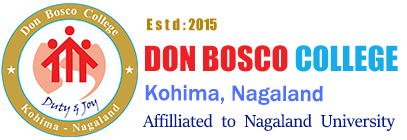Two Best Practices of Don Bosco College Kohima
Research Day For Faculty
Objectives of the Practice
To create right ambience and opportunities in research among faculties by motivating and encouraging the faculty members in research activities.
The Context
It involves every faculty with or without research experience to participate in the field of research along with their day to day activities. It encourages and challenges the teachers to look beyond the everyday activities and hence enhances their knowledge to overcome any obstacles that comes their way.
The Practice
A timetable is formulated in the beginning of the academic session. The faculty is allotted their own day of presenting their research work. Different resource person specialized in the area of the content are invited for feedback and suggestion which are used for refining the research paper for further improvement.
Evidence of Success
DBCK faculty received accolade for presenting and submitting the best article award in the one day International Multidisciplinary Conference on Research Methodology organized by Department of Economics and IQAC of Shri Pancham Khemraj Mahavidyalaya Sawantwadi, District, Sindhudurg. India.
Problems Encountered and Resources Required
With classroom teaching, dearth of time to involve in research work.
Availability of Resource person in the specialization
To maintain the quality of work
Bosco Green Allaince
Objectives of the Practice
Creating a new generation of environmentally committed citizens who ensure an environment that is safe and caring for all life on the planet.
The Context
DBCK uses a “four Pillars” framework that integrates efforts to reduce campus ecological footprints, make campus environment healthier, and get the whole community towards solutions to the problems we face.
The Practice
With the objective to create a sustainable environment, DBCK under the Green Initiatives, introduced the use of vermi-compost, solid waste segregation, liquid waste management, e-waste management, rain water harvesting, solar powered cells and other facilities, organic garden, car pooling, plastic and tobacco free zone.
Evidence of Success
DBCK has started its own organic garden, manures of vermi-compost were harvested, proper waste segregation, liquid waste management and rain water harvesting has been initiated and practiced, installation of solar vending machine and two solar classrooms.
Problems Encountered and Resources Required
It requires voluntary effort and initiatives. Limited space and time for effective implementation, financial assistance and funds mobilization required for larger projects.



